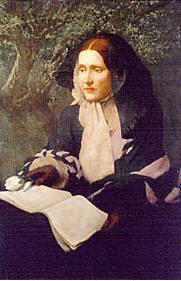
Arise, then, women of this day!
Arise all women who have hearts,
Whether your baptism be that of water or of tears
Say firmly:
"We will not have great questions decided by irrelevant agencies,
Our husbands shall not come to us reeking of carnage,
For caresses and applause.
Our sons shall not be taken from us to unlearn
All that we have been able to teach them of charity, mercy and patience.
We women of one country
Will be too tender of those of another country
To allow our sons to be trained to injure theirs.
From the bosom of the devastated earth a voice goes up with Our own.
It says, "Disarm, Disarm!
"The sword of murder is not the balance of justice!
Blood does not wipe out dishonor
Nor violence indicate possession.
As men have often forsaken the plow and the anvil at the summons of war,
Let women now leave all that may be left of home
For a great and earnest day of counsel.
Let them meet first, as women, to bewail and commemorate the dead.
Let them then solemnly take counsel with each other as to the means
Whereby the great human family can live in peace,
Each bearing after his own time the sacred impress, not of Caesar,
But of God.
In the name of womanhood and humanity,
I earnestly ask
That a general congress of women without limit of nationality
May be appointed and held at some place deemed most convenient
And at the earliest period consistent with its objects
To promote the alliance of the different nationalities,
The amicable settlement of international questions.
The great and general interests of peace.
Original Mother's Day a war protest
JESSE PUTNAMGUEST COLUMNIST
Three years ago several people gathered on the side of a Pittsburgh road to express support for the war in Iraq. Draped in U.S. flags, the pro-war assembly sang "The Battle Hymn of the Republic" as a way to demonstrate unity and patriotism. They likely did not realize they were singing words written by one of the country's most influential anti-war activists, Julia Ward Howe, the founder of Mother's Day for Peace.
Just as those pro-war protesters did not realize they were singing a pacifist's song, most Americans do not realize that Mother's Day began as an activist's response to war. Though the holiday has become a warm family tradition it began not as a feel-good national event but as an urgent call for women and mothers worldwide to unite against war.
"Why do not the mothers of mankind interfere in these matters, to prevent the waste of human life of which they alone know and bear the cost?" Julia Ward Howe wrote in 1870 during the Franco-Prussian war and just a few years after the Civil War ended.
Shortly after, she published her Mother's Day Proclamation, which was a call for peace and disarmament, and staked out a day to organize around. Howe's vision of a peace movement led by mothers gained support and the first Mothers' Peace Day festival was held in Boston on June 2, 1873.
Mother's Day for Peace was celebrated in at least 18 U.S. cities that first year and the tradition continued in Boston for the next 10 years. Though Howe's movement was not wide and the Peace Day tradition eventually faltered, her efforts nevertheless marked the beginning of two U.S. traditions: a peace movement and Mother's Day. In the beginning, these two pillars of Americana were one.
Four decades later, the idea of a day for mothers was revived by Anna Jarvis, whose own mother had previously tried to establish Mother's Friendship Days as a way to heal the divisions caused by the Civil War. Though it did not wholly share Howe's original intention and peace ideal, Jarvis' renewed effort took hold and in 1914 Mother's Day was proclaimed a national holiday by President Wilson.
A century later, Jarvis is largely forgotten, Howe's fame remains most connected to her work as author of the "Battle Hymn" and Mother's Day is a cozy albeit commercialized holiday.
Yet the roots of Mother's Day are rich with purpose and profound idealism. In her diary, Howe regarded her mother's day peace work as the most meaningful of her life. "I am 52 years old ... and must regard this year as in some sense the best of my life," she wrote in 1871. "The great joy of the Peace Idea has unfolded itself to me."
On this Mother's Day, as we honor our mothers and the lives they have given and nurtured, may the great peace idea find a home in all of us.
The author of this article, Jesse Putnam, is the great-great-great-grandson of Julia Ward Howe. A freelance writer, he lives in Seattle.


<< Home